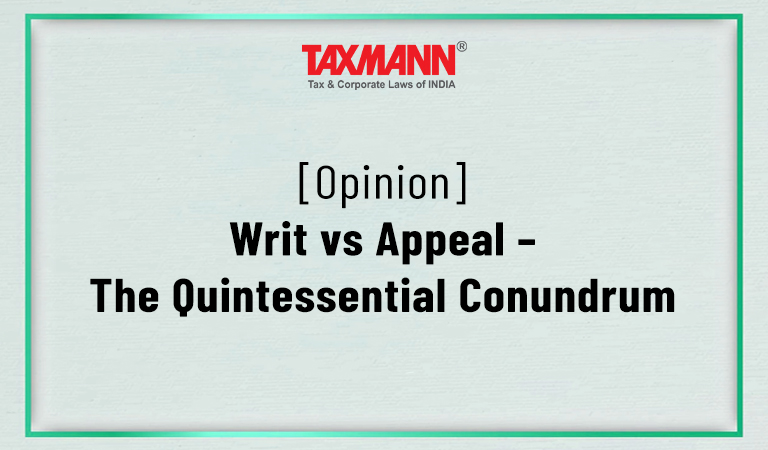[Opinion] Writ vs Appeal – The Quintessential Conundrum
- Blog|News|Income Tax|
- 2 Min Read
- By Taxmann
- |
- Last Updated on 7 December, 2022

Sanjeeva Narayan and Bhavesh Jindal – [2022] 145 taxmann.com 262 (Article)
Prologue
1. The question of resort to the regular appellate process as incorporated in the relevant governing statute as opposed to filing a Writ petition before Supreme/High Court seeking the exercise of its power of extraordinary review has been the focus of intense professional discussion.
2. The issue has gained increased focus in the recent past consequent upon the increased awareness (perhaps ill-informed) as a fall out of the proliferation of social media and the facilities provided by the implosion of the internet. In the context of taxation statutes, since the power to levy taxes and the process of their adjudication is derived from the Constitution and is subject to the limitations ascribed therein, a proper understanding and analysis of the underlying issues involved vis-à-vis the appellate process and the exercise of writ jurisdiction becomes critical to the judicious exercise of powers by the adjudicating authorities and awareness of and exercise of rights by the taxpayers.
3. The purpose of this article is to understand the underlying complementarily between the two seemingly conflicting courses of action by considering the basic concepts, constitutional and other regulatory provisions and the views of the various Courts of laws, specially the Apex Court, on the issue
Writs-concept, Definition & Constitutional Provisions
4. In its most elementary meaning, a “Writ” is a legal order given by a Court of law directing the behaviour of a lower court, agency, specific official or another branch of the Government to do or not to do something. A writ petition, in its essence is a petition to a higher court seeking the exercise of its extraordinary jurisdiction to intervene in a review of lower court/authority/agency’s order/proposed action. The Constitution of India grants powers to the Supreme Court and the jurisdictional High Court to issue “prerogative writs” reflecting their discretionary, prerogative and extraordinary powers.
5. Under article 32 of the Constitution of India, an aggrieved person can move the Supreme Court for a legal remedy in case of an alleged infringement of the Fundamental Right(s) for an appropriate writ, direction or order. Similarly, article 226 empowers High Courts to issue to any person or authority, including the Government (in appropriate cases) directions, orders or writs in the nature of habeas corpus, mandamus, prohibition, quo warranto, certiorari or any of them. The power of High Courts to issue writs under Article 226 of the constitution is much broader and can be issued for the enforcement of fundamental rights as well as for any other purpose. A writ is issued only in exercise of the supervisory jurisdiction of the High Courts under article 226 and not under their appellate jurisdiction.
Click Here To Read The Full Article
Disclaimer: The content/information published on the website is only for general information of the user and shall not be construed as legal advice. While the Taxmann has exercised reasonable efforts to ensure the veracity of information/content published, Taxmann shall be under no liability in any manner whatsoever for incorrect information, if any.

Taxmann Publications has a dedicated in-house Research & Editorial Team. This team consists of a team of Chartered Accountants, Company Secretaries, and Lawyers. This team works under the guidance and supervision of editor-in-chief Mr Rakesh Bhargava.
The Research and Editorial Team is responsible for developing reliable and accurate content for the readers. The team follows the six-sigma approach to achieve the benchmark of zero error in its publications and research platforms. The team ensures that the following publication guidelines are thoroughly followed while developing the content:
- The statutory material is obtained only from the authorized and reliable sources
- All the latest developments in the judicial and legislative fields are covered
- Prepare the analytical write-ups on current, controversial, and important issues to help the readers to understand the concept and its implications
- Every content published by Taxmann is complete, accurate and lucid
- All evidence-based statements are supported with proper reference to Section, Circular No., Notification No. or citations
- The golden rules of grammar, style and consistency are thoroughly followed
- Font and size that’s easy to read and remain consistent across all imprint and digital publications are applied



 CA | CS | CMA
CA | CS | CMA
